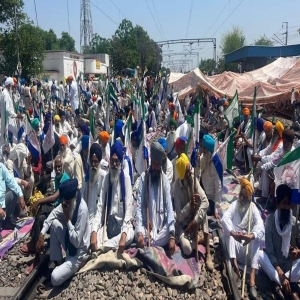
.png) Joseph Maliakan
Joseph Maliakan
.jpg)
Much water has flowed under the Yamuna bridge in Delhi since the Union Government, headed by Narendra Modi, repealed the three controversial farm laws in Parliament on November 29, 2021, following more than a year-long farmers' protest on the city's borders.
The farmers' protests led to the death of more than 750 farmers due to road accidents, bad weather, and natural causes. The protests ended after the Union government repealed the farm laws and promised to bring a bill for a guaranteed minimum support price (MSP) for various farm products.
The NDA government is entering its third term, but the MSP bill has yet to see the light of day. The government's other promises regarding doubling farmers' income by "2022" and implementing the recommendations of the 2004 MS Swaminathan Commission on Farmers are also hanging in the balance.
The impasse regarding the Indian farmers' longstanding grievances led to the 70-year-old farmer leader Jagjit Singh Dallewal, Convener of the Samyukta Kisan Morcha (non-political) (SKM), starting a fast unto death on November 26, 2024, at the Punjab—Haryana border.
Besides guaranteed MSP, the farmers are demanding debt waivers, pensions for farmers and farm labourers, and no increase in the electricity tariff. A month after he sat on fast unto death, Dallewal, who is suffering from cancer, told the media, "Seven lakh farmers of this country have committed suicide due to debt. It is necessary to save farmers, therefore I am sitting here. I am not under anyone's pressure."
Following the 2020-21 protest against farm laws, Kerala, Punjab, Chhattisgarh, Rajasthan, Delhi, and West Bengal passed resolutions against farm laws. Three states, Punjab, Chattisgarh, and Rajasthan, passed counter-legislation in their respective State legislatures, but none of the counter-legislation was signed into law by the state Governors, who lately do only the bidding of the Union Government.
Farmer bodies agitating for farmers' demands, the Kisan Mazdoor Morcha (KMM) and Samyukta Kisan Morcha (Non-political), the two umbrella bodies spearheading the farmers' agitation, are camping at Shambhu-Ambala and Khanauri-Jind on the interstate boundary after being stopped from entering Haryana.
On the 37th day of Dallewal's fast, KMM coordinator Sarwan Singh Pandher said that the farmers would continue the struggle until their demands were met. He added that dates for the Delhi march would be announced very soon.
A group of 101 farmers attempted to restart their foot march from Punjab to Delhi on 6, 8, and 14 December. However, the Haryana government put up massive barricades, which halted their march.
At the same time, the Samyukta Kisan Morcha, the umbrella organisation of some 500 farmers' organisations, has turned down the invitation to discuss the issue extended by the high-powered committee constituted by the Supreme Court. The committee, headed by a former High Court judge, Justice Nawab Singh, had invited the SKM to join its meeting on Friday, January 3, 2025.
"The SKM in principle does not accept intervention of the court because the farmers are fighting on policy issues with the Union government and hence the court has no role to play. In this context the SKM expresses its inability to accept the invitation for the discussion by the SC appointed High Powered Committee," the SKM said in a statement.
Commenting on the indefinite hunger strike by farmers' leader Jagjit Singh Dallewal, Union Agriculture Minister Shiv Raj Singh Chouhan said in New Delhi on Wednesday that the Union government will abide by the Supreme Court's directions on the strike. "The Supreme Court is looking into the matter. We will accept whatever decision the apex court takes," Mr Chouhan maintained.
On Thursday, January 2, the Supreme Court clarified that its direction to provide medical help and hospitalisation to Dallewal wasn't aimed at breaking his fast. A bench of Justices Suryakant and Sudhanshu Dhulia said he could continue his hunger strike under medical supervision.
The Supreme Court expressed its displeasure at a deliberate attempt by the Punjab government officers to give an impression that the court has been pressurising Dallewal to end his fast unto death.
"Our directions were not to break his fast. We only said that his health be taken care of and that he could continue his peaceful protest even when he is hospitalised. You have to persuade him from this angle," the bench told Punjab Advocate General Gurminder Singh. In other words, the Supreme Court's only concern was Dallewal's well-being, not the farmers' plight.
The court further said: "Shifting to the hospital does not mean he will not continue his fast. There are medical facilities that will ensure that no harm is caused to his life. THIS IS OUR ONLY CONCERN. His life is precious as a farmers' leader."
Now, the question is who is going to solve the farmers' problem. Until the Union government, in consultation with the state governments, enters into negotiations with the farmers' representatives, no solution is possible. Under the present circumstances, the Union Agriculture Minister waiting for directions from the Supreme Court will not yield any result because farmers' Unions have rejected Court intervention.